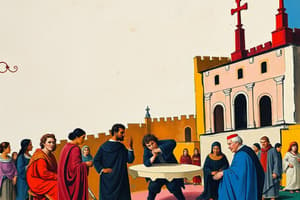Podcast
Questions and Answers
Which of the following best describes the impact of the Protestant Reformation on the ius commune?
Which of the following best describes the impact of the Protestant Reformation on the ius commune?
- It led to a more unified and universally accepted interpretation of Roman law.
- It reinforced the Church's legal authority, solidifying the role of the canon law.
- It had no effect on the ius commune, as the legal system was independent of religious doctrine.
- It disrupted the Church's legal influence and created competing legal interpretations. (correct)
How did the emergence of nation-states in the early modern period challenge the ius commune?
How did the emergence of nation-states in the early modern period challenge the ius commune?
- By developing unified national laws to assert political authority. (correct)
- By relying entirely on the interpretations of legal humanists.
- By accepting the universal legal authority of canon law.
- By actively promoting the ius commune as an ideal unified legal framework.
What was the primary objective of legal humanists in their approach to Roman law?
What was the primary objective of legal humanists in their approach to Roman law?
- To return to the original sources of Roman law and understand it in its original historical context. (correct)
- To provide commentary and annotations on existing Roman law texts.
- To create a new legal system to succeed the ius commune.
- To further the authority of medieval glossators and commentators.
In what areas of law did the ius commune continue to be especially influential despite the rise of national legal systems?
In what areas of law did the ius commune continue to be especially influential despite the rise of national legal systems?
Which best explains the resilience of the ius commune during the early modern period?
Which best explains the resilience of the ius commune during the early modern period?
Flashcards
Legal Codification
Legal Codification
The process of creating written law codes to unify and clarify legal rules, often used by emerging nation-states in early modern Europe.
Legal Humanism
Legal Humanism
The study of Roman law that emphasized returning to original sources and examining historical context, a significant movement in the Renaissance.
Ius Commune
Ius Commune
The body of common law shared across Europe in the Middle Ages and early modern period, based on Roman law and canon law.
Ius Commune and National Laws
Ius Commune and National Laws
Signup and view all the flashcards
Religious Conflict and Ius Commune
Religious Conflict and Ius Commune
Signup and view all the flashcards
Study Notes
Early Modern Challenges to Ius Commune
- Significant pressures on ius commune emerged in the 16th and 17th centuries, including political centralization, religious conflict, and legal codification.
- These factors led to challenges and adaptations within the ius commune.
Rise of Nation-States
- Emerging centralized states codified local and national laws, aiming to assert political authority and unify diverse territories.
- Codification challenged the ius commune's dominance.
Impact of the Reformation
- The Protestant Reformation diminished the Church's influence over law, weakening canon law's role within the ius commune.
- Religious divisions (e.g., Catholic-Protestant) fostered competing legal interpretations and practices.
Development of Legal Humanism
- Renaissance scholars revived Roman law by referencing original sources.
- Legal humanists critiqued earlier medieval legal interpretations for a more historical and textual approach.
- Key early modern scholars, like Jacques Cujas and Hugo Donellus, significantly impacted the study of Roman law via this new perspective.
Persistence of the Ius Commune
- Despite challenges, the ius commune remained influential, resolving disputes, and filling legal gaps in national laws.
- The ius commune readily adapted alongside national legal systems in areas like contracts and property law.
Conclusion: Ius Commune's Adaptability
- Although challenged by political and religious shifts, the ius commune demonstrated its adaptability and sustained its importance in European legal practices.
Studying That Suits You
Use AI to generate personalized quizzes and flashcards to suit your learning preferences.
Description
Explore the key challenges to ius commune during the early modern period, focusing on the rise of nation-states, the impact of the Reformation, and the development of legal humanism. Understand how political, religious, and legal transformations shaped this pivotal time in legal history.




